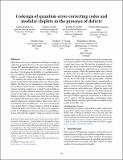Codesign of quantum error-correcting codes and modular chiplets in the presence of defects
Author(s)
Lin, Sophia Fuhui; Viszlai, Joshua; Smith, Kaitlin N.; Ravi, Gokul Subramanian; Yuan, Charles; Chong, Frederic T.; Brown, Benjamin J.; ... Show more Show less
Download3620665.3640362.pdf (1.577Mb)
Publisher Policy
Publisher Policy
Article is made available in accordance with the publisher's policy and may be subject to US copyright law. Please refer to the publisher's site for terms of use.
Terms of use
Metadata
Show full item recordAbstract
Fabrication errors pose a significant challenge in scaling up solid-state quantum devices to the sizes required for fault-tolerant (FT) quantum applications. To mitigate the resource overhead caused by fabrication errors, we combine two approaches: (1) leveraging the flexibility of a modular architecture, (2) adapting the procedure of quantum error correction (QEC) to account for fabrication defects.
We simulate the surface code adapted to defective qubit arrays to find metrics that characterize how defects affect fidelity. We then use our simulations to determine the impact of defects on the resource overhead of realizing a fault-tolerant quantum computer on a chiplet-based modular architecture. Our QEC simulation adapts the syndrome readout circuit for the surface code to account for an arbitrary distribution of defects. Our simulations show that our strategy for dealing with fabrication defects demonstrates an exponential suppression of logical failure, where error rates of non-defective physical qubits are ~ 0.1% for a circuit-based noise model. This is a typical regime on which we imagine running the defect-free surface code. We use our numerical results to establish post-selection criteria for assembling a device with defective chiplets. Using our criteria, we then evaluate the resource overhead in terms of the average number of physical qubits fabricated for a logical qubit to obtain a target logical error rate. We find that an optimal choice of chiplet size, based on the defect rate and target performance, is essential to limiting any additional error correction overhead due to defects. When the optimal chiplet size is chosen, at a defect rate of 1% the resource overhead can be reduced to below 3X and 6X respectively for the two defect models we use, for a wide range of target performance. Without tolerance to defects, the overhead grows exponentially as we increase the number of physical qubits in each logical qubit to achieve better performance, and also grows faster with an increase in the defect rate. When the target code distance is 27, the resource overhead of the defect-intolerant, modular approach is 45X and more than 105X higher than the super-stabilizer approach, respectively, at a defect rate of 0.1% and 0.3%. We also determine cutoff fidelity values that help identify whether a qubit should be disabled or kept as part of the QEC code.
Description
ASPLOS '24: Proceedings of the 29th ACM International Conference on Architectural Support for Programming Languages and Operating Systems April 27-May 1, 2024, La Jolla, CA, USA
Date issued
2024-04-27Department
Massachusetts Institute of Technology. Computer Science and Artificial Intelligence LaboratoryPublisher
ACM
Citation
Lin, Sophia Fuhui, Viszlai, Joshua, Smith, Kaitlin N., Ravi, Gokul Subramanian, Yuan, Charles et al. 2024. "Codesign of quantum error-correcting codes and modular chiplets in the presence of defects."
Version: Final published version
ISBN
979-8-4007-0385-0